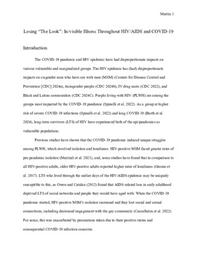I am writing this from my bed, the place I have spent 95% of my time for the last two months. I took energy supplements (that are bad for me) to work up the ability to write this entry (I will still get post-exertional malaise (PEM) from this task, just less). I am taking breaks every 10 minutes to rest for 5, which is called pacing, another strategy to reduce PEM and conserve energy.* I am laying down because I have orthostatic intolerance, which means that when I am sitting up or standing my nervous system goes haywire: I go into tachycardia and my blood pressure slightly drops. All of this feels extraordinarily wrong and contradictory to others' LiAs and my vision of this summer. But since my COVID infection last summer, I have significantly deteriorated. I have long COVID-induced ME/CFS**, a potentially lifelong illness with no established treatment, at the age of 20. At a time when most people believe COVID is “just a cold” and act accordingly. If they know long COVID exists, they decide it's not in the cards for someone like them, so it is not their problem.
I am now in a crash that has lasted a whopping two months and counting (most of the time they last days or weeks). When you are in a crash, you have to radical rest (do nothing, not even think, eyes closed) as much as possible to get out. Any (even mild) exertion (in my case, thinking, talking, feeling strong emotions, lifting light things, sitting up, don't even think about walking) pushes me deeper into the crash. My friends are doing the tasks to keep me alive. I've grown accustomed to being pushed in a wheelchair to the bathroom, but each time we take the journey back, I'm still a bit nauseated by this life. Everything I am experiencing is my research, over and over again. It is also a far cry from what I dreamed of: COVID, HIV, and community care teach-ins, zines, and PPE distros at the Lesbian Herstory Archive. My coordinators and I have adapted my LiA to become more (not fully) accessible*** to me in this state, mostly processing special collections. This has shattered my heart since, more than anything in this moment, I want/need to give my community the tools to protect themselves and others from the same fate.
That brings the question: how do I perform disability justice in my disabled body? When it’s overexertion to chew tough foods or read a few sentences? For now, I am confronting the fact that doing disability justice means taking care of myself and my community in the ways that are accessible to me. The Lesbian Herstory Archive is the perfect place to do so as a space of alternate histories. Additionally, it is one of the last queer spaces in NYC to take a semblance of COVID precautions (making it more welcome to disabled people). Making LHA’s knowledge more accessible and utilizing what I learn throughout my care web is doing disability justice. This week, I learned about the Saint Mark's Women’s Health Collective, the “oldest lesbian clinic in the nation,” and started to make its collection more accessible to viewers of the archive. Each time I dive deeper into queer histories of care, I become more motivated to reproduce and honor them in the world around me.
Building a relationship with the LHA has set the stage for sustained community engagement as I look beyond the Columbia community—an extremely inaccessible/ableist space—during my medical leave. I am excited to see where this journey takes me.
*This is one of the only things you can reliably do for my illness. There is no other established method to manage it and prevent deterioration.
**Do I have ME/CFS and long COVID, or do I have a form of long COVID that closely resembles ME/CFS? Likely the latter, though using that description is helpful since long COVID can impact any and every organ in the body / bodily system and comes in many forms beside my own. However, this is still not settled, since we are actually still living in the early days of the COVID pandemic, which makes sense when you look at a timeline of HIV/AIDS. This condition,in which the mild form cuts your capacity to do daily activities in half, is estimated to result from 1 in 20 Covid infections.
***What does it mean for something to be truly accessible? I would say that an accessible task could be performed without threat of it harming me. There is very little I can do in this state that is truly accessible to me, because most basic forms of living are over-exertion.

Please sign in
If you are a registered user on Laidlaw Scholars Network, please sign in